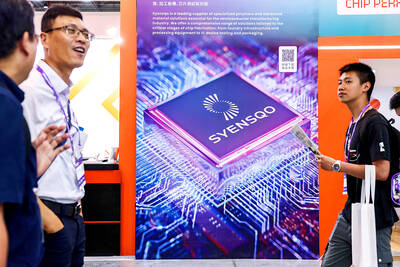Exports last month surged to a record high, fueled by strong global demand for artificial intelligence (AI) hardware and front-loaded shipments to the US ahead of potential tariff shifts, the Ministry of Finance said yesterday.
Outbound shipments spiked 38.6 percent from a year earlier to US$51.74 billion, topping US$50 billion for the first time, as global firms build up inventory over fears of renewed trade tensions once the 90-day truce between the US and China expires, Department of Statistics Director-General Beatrice Tsai (蔡美娜) said.
“Exports in May turned out much hotter than expected,” Tsai said, linking the extraordinary performance to a boost from AI-related demand and increased US orders, as US customers looked to get ahead of tariff uncertainties.

Photo: AP
Exports this month are expected to range between US$45.7 billion and US$49.9 billion, with year-on-year growth of 15 percent to 25 percent, she said.
Exports have increased for 19 consecutive months, with the cumulative amount over the first five months totaling US$229.96 billion, up 24.3 percent from the same time last year, the ministry said.
The US led demand growth, with exports soaring 87.4 percent to US$15.52 billion — a monthly record in value and pace, and overtaking China as Taiwan’s biggest export destination, ministry data showed.
China including Hong Kong was the second-largest buyer, with shipments swelling 27.2 percent to US$14.06 billion, Tsai said.
Exports to ASEAN nations climbed 52.3 percent, driven by surging demand for information and communications technology (ICT) goods, while shipments to Europe slipped 0.6 percent, she said.
Shipments to Mexico rose nearly 1.7 times, as the country has become a “tariff haven” for US-bound goods, she added.
Meanwhile, ICT and audiovisual products led export categories, more than doubling from a year ago, as servers, graphics processing units and personal computer components saw significant gains, Tsai said.
Electronic component exports, mainly semiconductors, increased 28.4 percent year-on-year, supported by continued momentum in AI and high-performance computing, she said.
Mineral product exports contracted 27.4 percent due to refinery maintenance and weak oil prices, Tsai said.
The share of non-tech product shipments is shrinking, comprising less than 30 percent in May, while ICT and electronic components contributed more than 72 percent, she said.
Imports rose 25 percent year-on-year to US$39.13 billion, resulting in a trade surplus of US$12.62 billion — also a record, the ministry said.
Export strength is expected to peak this quarter and slow in the second half of the year, running counter to traditional seasonality, Tsai said.
“There are signs that some client demand has been front-loaded, which could lead to a softer third quarter,” she said.
The Directorate-General of Budget, Accounting and Statistics’ prediction that first-half exports could hit a new high of US$279.9 billion appears “comfortably achievable,” Tsai said, adding that she remains wary of downside risks from trade protectionism, shifting US tariff policies and geopolitical tensions.

SEMICONDUCTOR SERVICES: A company executive said that Taiwanese firms must think about how to participate in global supply chains and lift their competitiveness Taiwan Semiconductor Manufacturing Co (TSMC, 台積電) yesterday said it expects to launch its first multifunctional service center in Pingtung County in the middle of 2027, in a bid to foster a resilient high-tech facility construction ecosystem. TSMC broached the idea of creating a center two or three years ago when it started building new manufacturing capacity in the US and Japan, the company said. The center, dubbed an “ecosystem park,” would assist local manufacturing facility construction partners to upgrade their capabilities and secure more deals from other global chipmakers such as Intel Corp, Micron Technology Inc and Infineon Technologies AG, TSMC said. It

People walk past advertising for a Syensqo chip at the Semicon Taiwan exhibition in Taipei yesterday.

NO BREAKTHROUGH? More substantial ‘deliverables,’ such as tariff reductions, would likely be saved for a meeting between Trump and Xi later this year, a trade expert said China launched two probes targeting the US semiconductor sector on Saturday ahead of talks between the two nations in Spain this week on trade, national security and the ownership of social media platform TikTok. China’s Ministry of Commerce announced an anti-dumping investigation into certain analog integrated circuits (ICs) imported from the US. The investigation is to target some commodity interface ICs and gate driver ICs, which are commonly made by US companies such as Texas Instruments Inc and ON Semiconductor Corp. The ministry also announced an anti-discrimination probe into US measures against China’s chip sector. US measures such as export curbs and tariffs

The US on Friday penalized two Chinese firms that acquired US chipmaking equipment for China’s top chipmaker, Semiconductor Manufacturing International Corp (SMIC, 中芯國際), including them among 32 entities that were added to the US Department of Commerce’s restricted trade list, a US government posting showed. Twenty-three of the 32 are in China. GMC Semiconductor Technology (Wuxi) Co (吉姆西半導體科技) and Jicun Semiconductor Technology (Shanghai) Co (吉存半導體科技) were placed on the list, formally known as the Entity List, for acquiring equipment for SMIC Northern Integrated Circuit Manufacturing (Beijing) Corp (中芯北方積體電路) and Semiconductor Manufacturing International (Beijing) Corp (中芯北京), the US Federal Register posting said. The